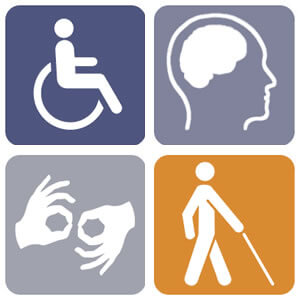The Importance Of Reasonable Adjustments For People With Disability

‘Reasonable adjustments’ are small changes that make a huge impact on those living with disability. For someone with health-related needs, small adjustments to their school or work environment could mean the difference in the success they see in that role.
There are health or personal circumstances that may require an individual to seek assistance through the implementation of reasonable workplace adjustments. People living with disability, those with caregiving responsibilities, those recovering from illness or injury, individuals managing chronic medical conditions, and victims of family or domestic violence may fall into this category.
‘Reasonable adjustments’ in a learning environment or workplace setting
Schools and workplaces recognise that providing accessible, inclusive work environments that allow people with disability to participate equally in work life is imperative. By adjusting their work environment through reasonable adjustment applications, people with disabilities can perform to the best of their abilities and fulfill their job duties as effectively as possible.
Understanding what is classified as a reasonable adjustment can be tricky, which is why the team at St Jude’s aims to work with individuals, and their loved ones, to highlight some reasonable adjustments that can be implemented to give those living with health-related needs the best opportunity to excel.
What are “reasonable adjustments”?

Measures or actions made to remove barriers for a person with disability to participate equally in a learning environment or workplace can be considered reasonable adjustments.
Some common reasonable adjustments include:
- Flexibility in working hours, such as offering part-time hours or later starting and finishing times.
- Making a wheelchair or other mobility aid users more comfortable and safe by moving furniture, widening a doorway, or installing a ramp.
- Adjustments to methods of testing and assessment in workplace recruitment processes.
- Buying or adapting equipment (see our previous blog on assistive technology). For example, those with vision impairment or blindness may be assisted by voice-activated software, a person with hearing difficulty may require an amplified phone, or a person unable to write notes may need a digital recorder.
- Providing height adjustable desks and ergonomic computer hardware in the learning facility or workplace.
- Providing workplace training to co-workers and supervisors.
- Re-delegating minor duties (which are outside the person with disability’s key job requirements) which they find difficult to do.
- Providing an Auslan interpreter or live captioning at meetings or workshops, for those employees with a hearing impairment.
Discrimination can be imposed on educational institutions and employers whose actions do not comply with the Disability Discrimination Act of 1992. As a result of this Act, people with a verified disability are now protected from discrimination and are provided with equal educational and employment opportunities.
How do organisations determine what is ‘reasonable’?
An individual’s circumstances will influence what is considered ‘reasonable’.
When considering whether specific adjustments are reasonable, the institute or organisation considers in what manner does the adjustment help the student or employee with disabilities perform their duties. They must also consider how practicable the adjustment is, from the cost of the adjustment, the institute or organisation’s resources, the extent of any disruption caused, other support available (e.g. the Employment Assistance Fund), and the nature of their business.
When it comes to studying or working, individuals with disabilities should not face unnecessary obstacles, such as lack of facility accessibility, or a desk set up which does not accommodate their needs. However, all accommodations must be reasonable and be made to meet their needs. Significant financial costs, an impossible building amendment, or one that unfairly disadvantages other employees can prevent adjustments from being made.
Common reasonable adjustments do not involve changing the inherent requirements of the job or creating a new one unless it is for training or rehabilitation purposes.
Instances when a reasonable adjustment does not need to be made

In general, employers are obliged to make reasonable adjustments for employees who have disclosed a disability unless doing so would cause an ‘unjustifiable hardship’ to the employer.
In certain circumstances, an adjustment may be considered unreasonable if the organisation or employer can show that it would be too costly, difficult, or time-consuming for the employee to make. This is called ‘unjustifiable hardship’, and it allows the organisation or employer to refrain from implementing certain changes in the workplace without breaking the law.
Request for adjustments
As part of a written request for an adjustment, individuals should describe the following:
- What the student or employee needs
- What their manager or education provider can do to assist them.
When determining if a suggestion is reasonable, analyse how the adjustments will improve performance. Medical documentation can be used to indicate whether an adjustment is reasonable.
Supporting documentation including all medical documentation must be taken into consideration by the manager, academic staff, or other representatives, in light of both the individual’s circumstances, work situation, and the overall context of the reasonable adjustment application submitted before a decision can be finalised.
Funding adjustments
Education providers and corporate management are responsible for the cost of any reasonable adjustments that have been approved for implementation. The cost of adjustments made is not the responsibility of the person with the medical condition or health related needs.
Funding for non-standard equipment and services may be available through Employment Assistance Fund. This Australian Government fund has been created to assist employers in making adjustments to build better working environments for those with disabilities to improve disability standards in the workplace.
The Employment Assistance Fund repays the cost of work-related adjustments and services for people with disabilities. This can include; adjustments to the physical work environment (for example wheelchair ramp, stairlift), adaptive equipment in the workplace (for example Braille device, lifting equipment), communication devices (for example software, PDA’s, voice recorders, smartphones, and laptops), disability awareness training, deafness awareness training, and mental health first aid training.
Choose the Help of Reliable Disability Support Services

The team at St Jude’s can assist with supporting documentation to form requests for reasonable adjustments, providing up-to-date information on laws and requirements, as well as funding options to help those with health related needs the best opportunity to excel.
St Jude’s is a trusted, local company, providing comprehensive disability support services to people across WA and QLD. We have over 38 years of experience caring for people with a range of support needs, and we offer a variety of services including an NDIS support coordinator, allied health services, residential aged care, home care, and mental health services.
If you would like to find out more about reasonable adjustments, or you need assistance applying for NDIS funding, then click on our contact details to get in touch with our friendly team today.
|
|


